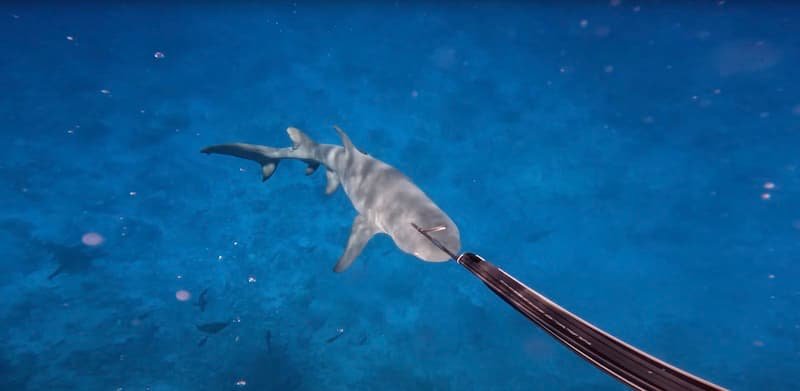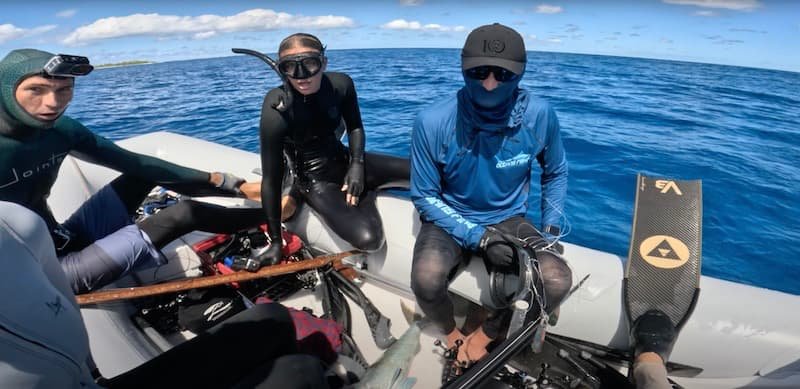In a recent venture through the Tuamotu Archipelago, Alchemy collaborator Josh Munoz found himself in the midst of a dogtooth tuna hunt when a pack of lemon sharks made a sudden appearance. While he emerged unscathed from the encounter, the experience was undeniably intense. Here are some essential considerations to bear in mind when spearfishing in the presence of nature's apex predators.
Encountering a shark, regardless of the species, presents a crucial moment where your actions can influence how the shark perceives you—as either a predator or potential prey. It's essential to consciously decide how you want to be viewed by the shark.
If a shark approaches and escape isn't an immediate option, maintaining composure is key. Stand your ground, projecting confidence without showing fear. In some cases, swimming towards the shark might deter it from approaching further. Understanding that sharks are opportunistic feeders, it's important to recognize that they prefer not to feel threatened. Each shark exhibits its own temperament, with some species being more aggressive than others.
Assess the situation by identifying the shark species, gauging its behavior, size, and proximity to you. Whether you're snorkeling, freediving, or spearfishing, it's not always necessary to exit the water immediately upon spotting a shark. Most of the time, sharks will observe and evaluate before taking any action, ensuring that you're not perceived as a threat.
To assert dominance and discourage potential aggression, demonstrate confidence and maintain your position. By doing so, you establish yourself as a fellow predator rather than prey. While the shark may remain curious, it's less likely to view you as a meal, especially if you're spearfishing and have fish in the water or chum present. With their keen sense of smell, sharks will investigate the scene, much like a dog sniffing for scraps, to determine if there's anything worth scavenging.

Conversely, swimming away from the shark can pique its curiosity and potentially lead to a closer encounter, increasing the risk of a bite. Therefore, my recommendation is to avoid swimming away and instead confront the shark directly, maintaining your position and displaying confidence to assert your status as a fellow predator in the water.
If you find yourself standing your ground and exhibiting confidence, yet the shark continues to approach aggressively, particularly if you're armed with a speargun, consider using it as a protective barrier between yourself and the shark. Sharks possess highly sensitive areas, such as their nose and gills, which are receptive to external stimuli. By extending the speargun outward, you create a barrier that may deter the shark from advancing further. If the shark gets too close to the spear's tip, it may inadvertently poke itself in the nose, causing discomfort and prompting it to rethink its approach. This tactic can effectively dissuade the shark from persisting in its aggressive behavior, as it associates proximity to you with discomfort and potential harm.

If you find yourself needing to poke the shark once, and it persists in its approach, requiring multiple pokes, it's prudent to consider exiting the water, particularly if there are multiple sharks present. Aggressive behavior from one shark can escalate quickly, influencing others to follow suit in a domino effect. At this juncture, exercise your best judgment and prioritize your safety. In such intense situations, your senses are heightened, and your mental clarity reaches unprecedented levels due to the imminent threat to your life.

As spearfishers and freedivers, our focus on breath-holding and task execution can sometimes detract from awareness of our surroundings, leaving us vulnerable to surprise encounters with sharks. Remember, you're in their domain, where they can navigate effortlessly while remaining virtually undetectable to you. They have the advantage of stealth and speed, capable of approaching you much faster than you can perceive.
When swimming against the current or focusing on a specific location, it's advisable to periodically scan your surroundings by dipping your head down, ensuring a 360-degree view of your surroundings. In situations where you've speared a fish and sharks are in the vicinity, there's no definitive protocol to follow. Each circumstance is unique, and decision-making must be guided by your clarity of thought and assessment of the situation.